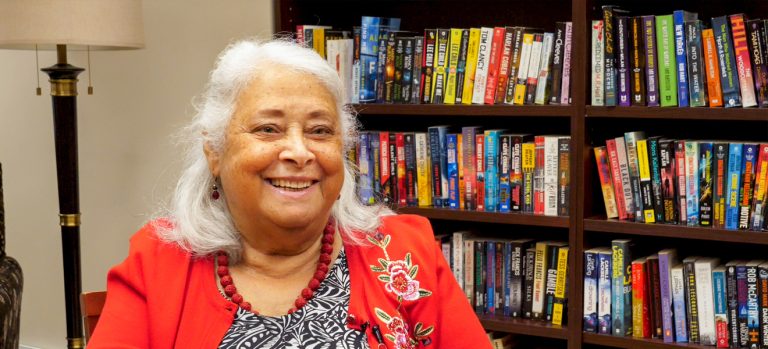Earlier this year, I met Brenda during a visit to The Good Companions Seniors’ Centre.
“Some people do well alone, isolated. I don’t. I like people,” she told me.
Around this time of year, I find myself thinking about Brenda and how many seniors will be alone over the holidays.
It’s difficult to think about the overwhelming isolation many of them feel, and the stress that caregivers are under.
Brenda is 73 years old and lives alone. The Good Companions gives her a chance to connect with others, either by phone or in person.
Several years ago, Brenda was listening to the radio when she heard about a program called Seniors’ Centre Without Walls. The program offers lectures, music, trivia, and other activities that seniors can join by phone—no matter where they are.
United Way East Ontario knows preventing loneliness and isolation is key to a senior’s well-being. We work with partners across Prescott-Russell, Ottawa, Lanark County, and Renfrew County to find lasting solutions to complex, chronic, local issues. That is our promise 365 days a year—during crises and normal times.
“It’s really an amazing group that gives an opportunity to seniors who cannot go out because of isolation or because they cannot move or they are unable to get up from bed,” Brenda said. “It’s a great community that keeps people engaged, so they don’t feel like it’s just four walls and the caregiver with them.”
With partners like The Good Companions, we’re ensuring seniors stay safe, healthy, and connected.
Together, we expanded the Seniors’ Centre Without Walls program during the pandemic to reach more people than ever before. As we slowly and safely get back to in-person activities, The Good Companions’ doors are open.
That’s good when you consider that across Eastern Ontario, seniors are often one of the most vulnerable populations. While many local seniors live well independently, others have a more difficult time. In fact, more than 30 percent of seniors in some local neighborhoods live in low-income situations and more than 25 percent live alone, making them more vulnerable to social isolation and poor health outcomes as a result.
When a senior is vulnerable in more than one way, the challenges they face are even greater. Those living on a low income, are Indigenous, single, newcomers, women, have a disability, are a part of the 2SLGBTQ+ community, or live in rural areas are more likely to face significant challenges when it comes to mental health and overall well-being.
“For me, it’s the difference between being alone all day or, for a couple of hours a day, having other voices—friends—to talk to,” said Brenda.”It makes you feel that you are not alone in this struggle. There are 25 people there that are going through the same thing. They’re trying to stay afloat, the same way that you are,” she added.
That’s why United Way leads strategic initiatives, conducts research, supports programs, and advocates to make sure our aging population is well cared for.
Brenda enjoys going to in-person coffee chats, lunches, and bingo. Wanting to help others ease back into being face-to-face, she threw herself a birthday party.
“It was a good way to get people out. I told everyone, ‘It’s my birthday and we are going to the Centre. There is no Zoom,’” she laughed.
Many seniors are still anxious about getting COVID-19 because they are at higher risk of severe illness. Many deal with overwhelming loneliness, have difficulty coping, and may live without supports like family, friends, or doctors. Finding transportation to in-person events is also a challenge. So, programs are still available by phone and Zoom for those who can’t make trips to attend in-person programming.
Brenda’s birthday party was in July, but the best gift you can give her is a donation that ensures more seniors feel connected.


